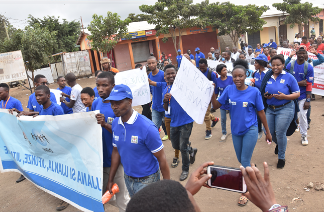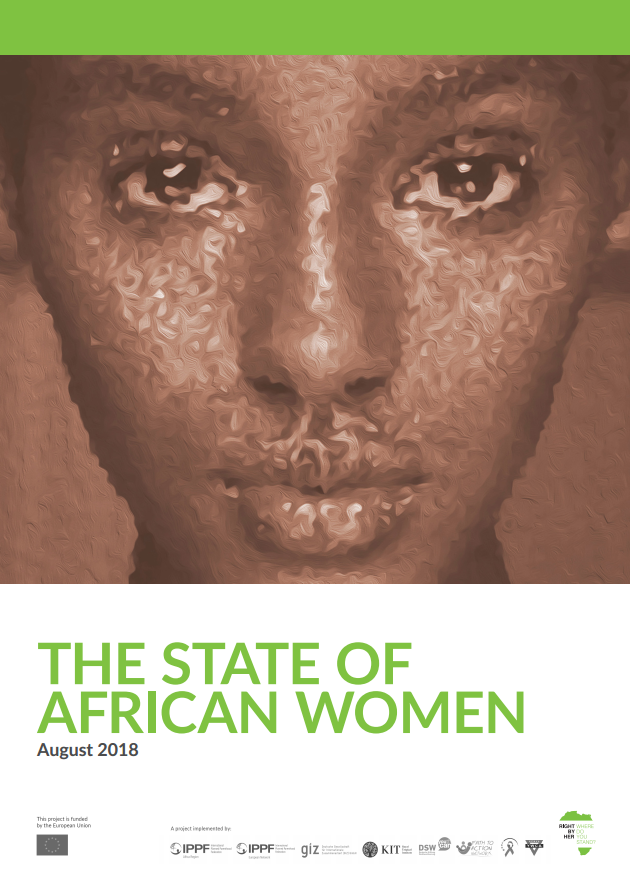A presentation of our project working to end female genital mutilation in Tanzania

First of all, the cultural practice that we’re talking about here is called genital mutilation. Out of respect for those affected, we will speak of circumcised girls and women.
One former circumciser tells us about the procedure: “We used sharp objects such as a razor blade, scissors or ‘Omuruna’ – a traditional stone for circumcision. The tools were rarely disinfected and the girls who were subjected to this did not get anything to relieve their pain while their labia and clitoris were removed. This process could lead to infections, for example exposure to HIV. I do not know how many girls I infected in this way.”
Today, this woman doesn’t practice this anymore, but she still wants to keep her anonymity. We spoke with her and many other people in a study a DSW project working against female genital mutilation in Tanzania. Around 15 percent of women between the ages of 15 and 49 were victims of this procedure, and the practice is prevalent more in rural areas than in cities. More than 80 percent of circumcised women are in favor of the abolition of this practice, in which the external genitalia, such as the clitoris or labia, are removed in whole or in part. After the open wound is sutured, there is usually only a small hole left for urine and menstrual blood. Many girls die during the procedure or later on from complications.
Genital mutilation in Tanzania has been outlawed since 1998, but the practice remains hard to stop completely.
Why is genital mutilation practiced?
The answer is not that easy, because female genital mutilation is not limited to a particular country or religion – it transcends very different cultures and contexts. However, where it is carried out, it has a long tradition and is linked to patriarchal social structures with women in subordinate positions, it is associated with myths about the perceived health benefits that come with the procedure, and is also linked to contexts of financial hardship. Although most circumcisions take place before the age of five, they are considered part of a ritual that marks the passage of a girl into womanhood. This may be associated with the idea that circumcised girls feel less pleasure in sex, and so do not cheat on their future husband, and are thus made “good wives”. If marriage is considered the only option for the future of a girl, much depends on her “ability to marry”. So parents are often afraid that no man will want their daughter if she is not circumcised – so they force their daughters to undergo the procedure.
Here’s what we’re doing to change this
At the center of our Tanzanian project are girls and young women who have been victims of female genital mutilation, or are at risk of becoming victims in the future. Our job is to give them the strength and the support that they need! We help them get together in clubs where they can share their experiences and information they feel is important to pass on to others. In addition, we train young women to become youth counselors so that they become mediators and advocates for their own needs and priorities. They not only discuss the serious consequences of the practice with their peers, but also speak publicly at events, such as a demonstration for the Youth Day in Arusha, where they can raise their concerns and objections. We tag onto this outreach activity workshops in which young women learn the basics of business management, because if young women have better economic prospects and can be financially independent, the pressure from their parents to find a suitable husband might also be reduced.
But without the men, none of this will work. After all, in many places they are the ones who have something to say. That’s why we always include male adolescents in our work. Through our contacts with the community, for example, we identify young men who are already openly opposing genital mutilation. We actively engage them and teach them how to support girls and young women in their positions advocates against the practice. These “allies” are also involved in dialogue events and in the training of other (male) youth counselors. In addition, working with parents, teachers, community leaders, and politicians plays a key role, as these influential groups can achieve long-term change by treating the issue seriously and by opposing FGM. Through the media, we encourage journalists and radio announcers to draw attention to the topic of genital mutilation and we work to help strengthen critical voices.
What we’ve achieved so far.
Since the beginning of this project in July 2018, youth counselors have strengthened the exchange of information between young women and health care institutions – helping to reduce the inhibition threshold for young people to seek treatment and seek help in this way when it comes to FGM.
In addition, around 100 young women have already completed business management courses, and close cooperation with government officials has given them important contacts with training companies in the private sector. The participants have reported that they were able to increase their self-esteem through the activities within the project, and now make their voices heard when it comes to their rights.
This progress shows that this kind of work can make a big difference in the lives of girls and women in Tanzania! However, to continue this we need help. You can find out more about our work and get in touch about ways you can support us as we continue to fight for a world without FGM.
Have you also heard about our Right by Her Campaign? We are working hard to make women’s rights a reality across Africa, focusing on four key areas: SRHR, HIV & AIDS, harmful practices, and gender-based violence. Together with our partners, and our donor the EU, we research the status of inequality, advocate for change, raise awareness, and build the capacity of civil society. To learn more about this project visit: www.rightbyher.org


